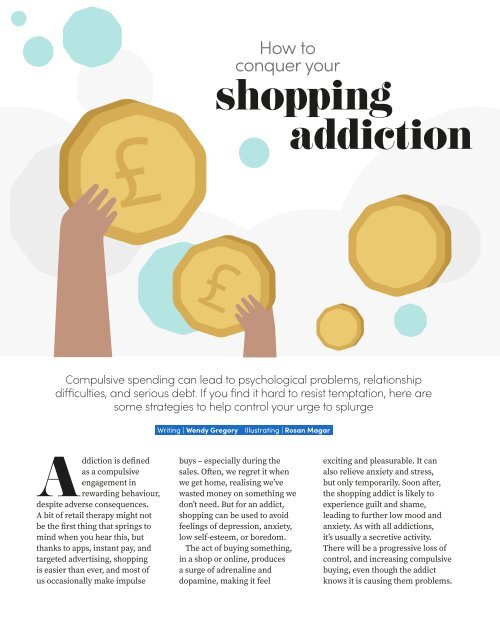Happiful February 2020
Create successful ePaper yourself
Turn your PDF publications into a flip-book with our unique Google optimized e-Paper software.
How to<br />
conquer your<br />
shopping<br />
£<br />
addiction<br />
£<br />
Compulsive spending can lead to psychological problems, relationship<br />
difficulties, and serious debt. If you find it hard to resist temptation, here are<br />
some strategies to help control your urge to splurge<br />
Writing | Wendy Gregory Illustrating | Rosan Magar<br />
Addiction is defined<br />
as a compulsive<br />
engagement in<br />
rewarding behaviour,<br />
despite adverse consequences.<br />
A bit of retail therapy might not<br />
be the first thing that springs to<br />
mind when you hear this, but<br />
thanks to apps, instant pay, and<br />
targeted advertising, shopping<br />
is easier than ever, and most of<br />
us occasionally make impulse<br />
buys – especially during the<br />
sales. Often, we regret it when<br />
we get home, realising we’ve<br />
wasted money on something we<br />
don’t need. But for an addict,<br />
shopping can be used to avoid<br />
feelings of depression, anxiety,<br />
low self-esteem, or boredom.<br />
The act of buying something,<br />
in a shop or online, produces<br />
a surge of adrenaline and<br />
dopamine, making it feel<br />
exciting and pleasurable. It can<br />
also relieve anxiety and stress,<br />
but only temporarily. Soon after,<br />
the shopping addict is likely to<br />
experience guilt and shame,<br />
leading to further low mood and<br />
anxiety. As with all addictions,<br />
it’s usually a secretive activity.<br />
There will be a progressive loss of<br />
control, and increasing compulsive<br />
buying, even though the addict<br />
knows it is causing them problems.

















